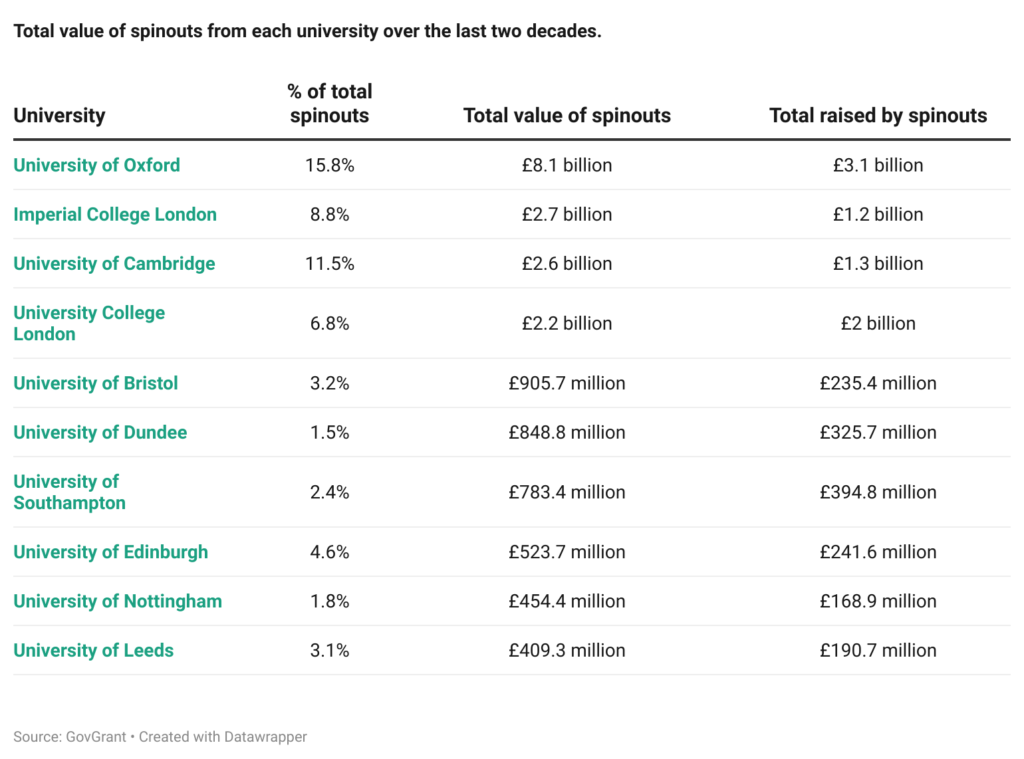Two Scottish universities are among the top eight in the UK for producing the most successful spinouts over the past 20 years.
A new report has named the University of Dundee as the nation’s sixth most prolific at commercialising innovation, whilst the University of Edinburgh came in at number eight.
Research carried out by intellectual property (IP) experts GovGrant found that Dundee’s spinouts have raised £325.7 million over the last two decades, and account for 1.5 per cent of the UK’s total spinouts.
The university is also commended for generating some of the highest value spinout companies in the UK, the most successful being Exscientia – a global pharmatech company currently valued at £784.5m.
The University of Edinburgh is responsible for 4.6 per cent of the UK’s total spinouts, the most successful of which is biopharma multinational MTEM, worth £140m.
It has also raised more from spinouts – £241.5m – in the last two decades than the University of Bristol, which raised £235.4m.

In terms of universities which have produced the highest number of spinouts over the past decade, the University of Strathclyde has made strides into the top 10, having come just outside of it prior to 2008. It is now seventh, alongside the Royal College of Art.
The University of Edinburgh comes in at number five on this list, having produced 3.1 per cent of spinout companies in the UK since 2008.
One sixth of spinout companies in the UK (16 per cent) originated from Oxford University. This is followed by the University of Cambridge with more than 11 per cent of UK spinout companies and Imperial College London, which has contributed to 9 per cent of the UK total.
In total, the top 10 UK spinout companies by valuation are worth approximately £9.8 billion. Of these 10, eight are in the healthcare industry. Healthcare is the dominant sector for successful UK spinouts, accounting for 45 per cent. IT is the next most successful with 24 per cent, almost half as many as healthcare.

David Richardson, chief entrepreneurial executive at Heriot-Watt University, said: “Universities are a rich source of cutting-edge researchwhich enables new learning, discovery, and innovation. Cutting edge research and the ability to develop and understand how new technologies advance industry and society are critical factors for ensuring future prosperity.”
“Success comes from building on research specialisms, and using these to catalyse new collaborations, investment, and jobs through the development of dynamic ecosystems focused on advanced R&D [research and development], talent development and commercialisation.”
“In addition to investment, spin-outs attract skilled graduates and high-performing academic researchers from across the globe to the UK. On average, they recruit around 12 employees per company. Between 2016 and 2018 alone , UK university spin-outs employed over 23,000 people.”
Adam Simmonds, investment research analyst at GovGrant, said: “This report highlights the huge value to the economy of UK universities, as well as the incredible depth of creativity and talent at our universities.
“It’s no surprise to see pharmaceutical and biotech spinouts feature prominently: the UK is particularly renowned for innovation in these areas. You only need to look at the recent development of Covid-19 vaccines in the UK to see how accomplished we are in pharmaceutical innovation.”
The University Spinout Report 2021 was produced by IP specialists and research and development (R&D) tax credit experts GovGrant to celebrate the UK’s position as a global leader in innovation.
It is based on analysis of just under 1,000 UK spinout companies, a sample that comprises £19.28 billion of capital invested, 4,489 deals and 1,907 investors.

When it comes to which universities have produced the largest number of spinouts over the past two decades, Edinburgh University is joint fifth with the University of Manchester, while the University of Glasgow holds the spot of number 10 with Queen’s University Belfast.




